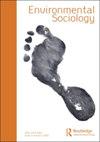Beyond maladaptation: structural barriers to successful adaptation
IF 2.8
Q3 ENVIRONMENTAL STUDIES
引用次数: 5
Abstract
ABSTRACT Around the world adaptation projects are being implemented, with the hope of essentially climate proofing communities. While there is an abundance of failed adaptation schemes in developing and developed countries alike, there has been little scholarship on this problem. Through interviews with twenty-two climate change adaptation practitioners, we identify four structural challenges that contribute to maladaptation: the focus on technological fixes versus holistic approaches; the difficultly of distinguishing between adaptation and development; the problem of quantifying non-quantifiable variables; and the existence of competing problems given that failure to mainstream climate change adaptation. Addressing these maladaptation dynamics is necessary to enhance successful adaptation processes.超越适应不良:成功适应的结构性障碍
摘要世界各地都在实施适应项目,希望社区基本上能抵御气候变化。尽管发展中国家和发达国家都有很多失败的适应计划,但关于这个问题的学术研究却很少。通过对22名气候变化适应从业者的采访,我们确定了导致适应不良的四个结构性挑战:关注技术修复与整体方法;区分适应和发展的困难;量化不可量化变量的问题;以及由于未能将适应气候变化纳入主流而存在相互竞争的问题。解决这些适应不良的动态对于加强成功的适应进程是必要的。
本文章由计算机程序翻译,如有差异,请以英文原文为准。
求助全文
约1分钟内获得全文
求助全文
来源期刊

Environmental Sociology
ENVIRONMENTAL STUDIES-
CiteScore
4.60
自引率
12.00%
发文量
34
期刊介绍:
Environmental Sociology is dedicated to applying and advancing the sociological imagination in relation to a wide variety of environmental challenges, controversies and issues, at every level from the global to local, from ‘world culture’ to diverse local perspectives. As an international, peer-reviewed scholarly journal, Environmental Sociology aims to stretch the conceptual and theoretical boundaries of both environmental and mainstream sociology, to highlight the relevance of sociological research for environmental policy and management, to disseminate the results of sociological research, and to engage in productive dialogue and debate with other disciplines in the social, natural and ecological sciences. Contributions may utilize a variety of theoretical orientations including, but not restricted to: critical theory, cultural sociology, ecofeminism, ecological modernization, environmental justice, organizational sociology, political ecology, political economy, post-colonial studies, risk theory, social psychology, science and technology studies, globalization, world-systems analysis, and so on. Cross- and transdisciplinary contributions are welcome where they demonstrate a novel attempt to understand social-ecological relationships in a manner that engages with the core concerns of sociology in social relationships, institutions, practices and processes. All methodological approaches in the environmental social sciences – qualitative, quantitative, integrative, spatial, policy analysis, etc. – are welcomed. Environmental Sociology welcomes high-quality submissions from scholars around the world.
 求助内容:
求助内容: 应助结果提醒方式:
应助结果提醒方式:


